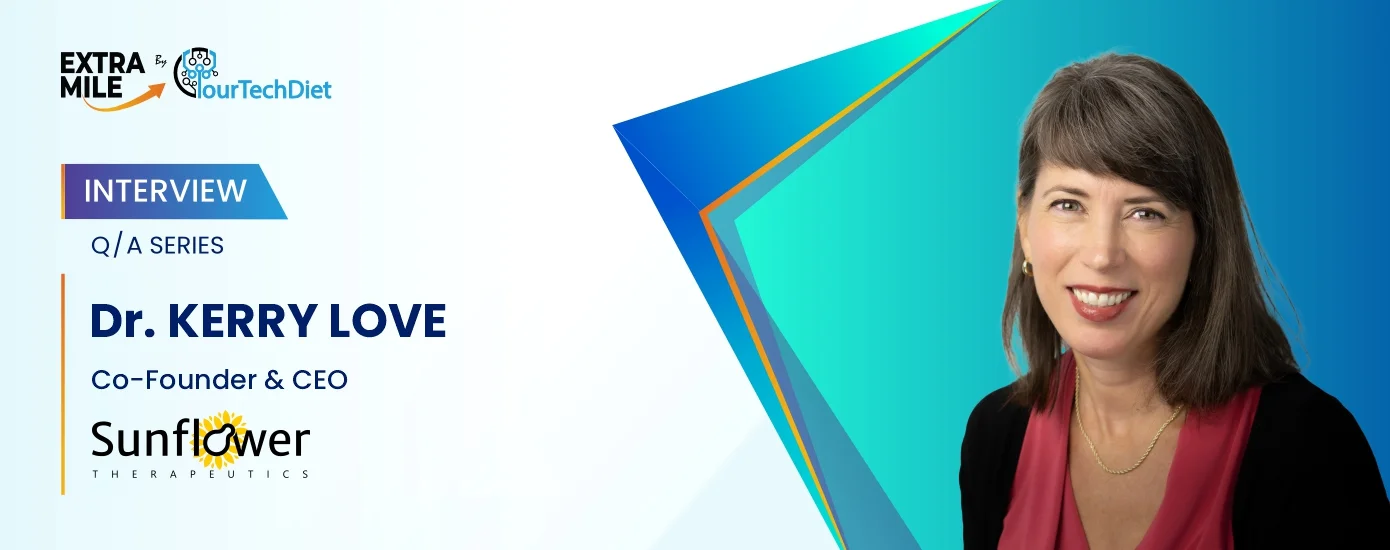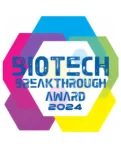Welcome to ExtraMile by YourTechDiet, where we bring you candid conversations with innovators shaping the future.
In this session, we are excited to welcome Dr. Kerry Love, the Co-Founder and CEO of Sunflower Therapeutics, a company on a mission to simplify and decentralize protein manufacturing solutions. Dr. Kerry’s journey from her research days at MIT and Harvard to leading global innovation in biomanufacturing is quite inspiring.
Sunflower Therapeutics is a biotech company doing things in a smarter and more impactful way. With its Daisy Petal perfusion fermentation system and intuitive HelianthOS software, the company is making biologics production more accessible, scalable, and sustainable for communities around the globe.
In this Q&A, Dr. Love opens up about the challenges of modern biologics manufacturing, the real-world impact of Sunflower’s technologies, and how distributed, automated solutions are changing the game for global healthcare, food science, and beyond.
Let’s dive into Dr. Kerry Love’s insights and explore how Sunflower Therapeutics is building a future where anyone, anywhere, can manufacture what matters.
1. Sunflower Therapeutics’ mission is to make protein manufacturing accessible worldwide. What inspired you to take on this challenge? How do you see it transforming global healthcare?
Kerry. My lifelong passion for science and a deep commitment to creating meaningful social impact through innovation were primary drivers of my inspiration to address accessibility. Earlier in my career, I had the opportunity to manage high-profile programs like DARPA’s InSCyT program and the Gates Foundation’s ULTRA program, both focused on improving vaccine and biologic drug manufacturing. These experiences were pivotal in shaping my understanding of the global challenges in healthcare and solidified my drive to pursue solutions that could make medicines more accessible and equitable. The next step in my journey was co-founding Sunflower Therapeutics, where I now serve as CEO and president.
By making manufacturing distributed, more efficient, and cost-effective, we can help bring vital biologics to communities around the world with greater reliability and speed. This has the potential to reshape global healthcare by supporting rapid development and delivery of vaccines and biologics, especially in regions where traditional manufacturing methods are often too complex or costly to deploy.
2. Your proprietary Daisy Petal system simplifies protein production. Would you tell us how perfusion fermentation works and why it is a game-changer compared to traditional methods? Can you tell us about the HelianthOS software?
Kerry. Perfusion fermentation is a process for the continuous cultivation of living hosts for production of biologically derived materials. Traditional perfusion methods used in mammalian cell culture rely on external devices that separate cells and return them to the bioreactor while harvesting spent media. This approach doesn’t work well for microorganisms, however, because of their high respiratory activity. To overcome this challenge, our team developed a novel cell retention device (CRD) that operates entirely inside the bioreactor vessel. This innovation allows for continuous feeding of fresh nutrients, removal of waste, and retention of biomass, all without removing cells from their controlled environment inside the bioreactor.
The Daisy Petal™ system leverages this pioneering capability to maintain a stable and efficient bioprocess capable of sustaining long production campaigns. Coupled with automation and user-friendly design, it enables fermentation processes to achieve protein yields five to ten times greater than traditional fed-batch methods, making it a true game-changer in protein manufacturing.
HelianthOS™ is a part of our bioprocessing software suite, compliant with Good Manufacturing Practices (GMP) for use in regulated biomanufacturing. In addition to HelianthOS™, our software suite includes Nursery™ and Harvest™. Together, these tools enable walkaway automation of fermentation processes, easy development of process recipes with no coding, and the secure storage of process data generated by the Daisy Petal™ System. Together, these three elements provide a cohesive ecosystem that enables efficient and intuitive operations throughout an entire campaign.
3. Biologics manufacturing is complex and costly. What were the biggest hurdles in developing Sunflower’s platform? How did you overcome them while maintaining high-quality production?
Kerry. One of our biggest challenges was designing a platform that simplifies biologics manufacturing while ensuring consistent, high-quality protein production. When we operationalized our business, the onset of the COVID-19 pandemic created unprecedented global supply chain disruptions that highlighted the urgent need for robust and flexible biomanufacturing capacities. The crisis made it clear that while discovery and R&D are vital, manufacturing capability is essential to getting vaccines and treatments to patients quickly.
This reality sharpened our focus on building a platform that can deliver reliable, continuous production with streamlined workflows in diverse manufacturing environments. Ultimately, the pandemic reinforced the importance of expanding manufacturing solutions that can respond rapidly to global health needs, fueling our commitment to advancing efficient, scalable bioprocessing.
4. The company was named “Lifescience Manufacturing Solution of the Year” by BioTech Breakthrough. How does such recognition impact your team’s motivation and the company’s growth trajectory?
Kerry. This award is incredibly meaningful for the entire team at Sunflower Therapeutics. It was a strong validation that the work we’ve been doing to develop the Daisy Petal™ system is resonating within the industry. For me personally, it’s inspiring to see our vision of lowering barriers in biomanufacturing recognized on such a widely respected platform.
As we continue to innovate and scale, this recognition fuels our momentum and shines a spotlight on how our technology can support researchers at every stage of the process. Winning this award is just the beginning for the Daisy Petal™ and our team. We’re committed to continuing to drive innovation and providing solutions that are both powerful and accessible. We believe in a future where protein production is not limited by expensive infrastructure or complex expertise, but instead it is available to researchers, companies, and organizations working on the next breakthrough in medicine, synthetic biology, and beyond.
5. You have partnered with the Gates Foundation and SK Bioscience. How do these collaborations accelerate your mission, and what’s next in Sunflower’s expansion plans?’
Kerry. Both collaborations have been instrumental in advancing our work. The Gates Foundation supported us early on with a grant in 2019 that helped us develop the Daisy System™. Additional funding later enabled us to demonstrate the capability to produce multiple proteins, including a COVID-19 vaccine subunit, and optimize the Dahlia System™, as well as de-risking protein product candidates for cost-effective manufacturing in low- and middle-income countries using our technology.
Our partnership with SK bioscience leverages our expertise in integrated biomanufacturing processes, contributing to accessible vaccines for public health crises such as HPV and cervical cancer. Their recent investment in 2024 reflects a shared commitment to advancing alternative approaches to vaccine manufacturing that are both innovative and practical.
As for what’s next, the commercial launch of the Daisy Petal™ was an incredibly exciting and rewarding milestone for us. Our ongoing commercialization efforts are taking the main stage, and we’re proud to bring our innovative protein manufacturing solutions to new markets and extend the reach of these technologies to more innovators around the world.
6. Your technology promises efficiency and sustainability. How do you ensure that the company’s solutions are cost-effective and environmentally friendly? How do you reduce the environmental footprints of biologics manufacturing compared to conventional methods?
Kerry. Traditional biomanufacturing is capital intensive, slow to adapt, and concentrated in certain geographies. It typically takes three to five years and over $200 million to build conventional biomanufacturing facilities. On top of this, these types of facilities are often built for a single product type and cannot rapidly adapt to changes in product demand, making it especially difficult for smaller and mid-size biotech players to scale.
The Daisy Petal™ perfusion fermentation system fundamentally rethinks how proteins are produced. It is compact, automated, and designed to simplify complex workflows. With fewer manual interventions and a smaller footprint, it reduces waste, lowers energy demands, and limits the need for expansive, capital-intensive infrastructure. For emerging biomanufacturers and groups in resource-limited settings, this enables high-quality production with significantly lower startup and operational costs.
By leveraging continuous manufacturing, our systems achieve space-time yields that are five to ten times greater for diverse proteins compared to traditional fed-batch methods, while also reducing inefficiencies from downtime and operational costs. This level of efficiency means that our systems can produce more protein with less media, fewer consumables, and a smaller operational footprint, translating directly into both cost and environmental benefits.
Continuous manufacturing also opens the door for localized production of biologics, minimizing reliance on fragile global supply chains and increasing the availability of essential medicines in diverse geographies. It’s a model that scales efficiently and sustainably, and it’s one we believe will be essential for the future of global health and growth in the alternative protein sector.
7. Apart from therapeutics, what other possible applications do you see for your protein production technology in fields like food or material science?
Kerry. Beyond therapeutics, our protein manufacturing solutions can be used for the production of a variety of diverse biomolecules, like foods, reagents and other biologically-derived materials. We’re currently exploring our technologies’ use in the alternative protein sector, including the production of recombinant proteins for food applications, like dairy or meat alternatives – an exciting growth area. There is currently no path to commercial viability for commodity food ingredients made through precision fermentation without major innovation around the bioprocess, and with global food demands expected to increase by more than 50% in 2050, the impact of our technology in this space is both timely and transformative.
8. What are the next major milestones for Sunflower Therapeutics?
Kerry. Looking ahead, one of our key priorities is building out GMP manufacturing capabilities to support partners through pre-clinical and clinical development. By combining our deployable technology with GMP services, we’ll be able to offer a more integrated path from discovery to production. We’re also focused on expanding the reach of our platform through direct sales with our growing distributor partner network. These efforts all support our broader vision: to make high-quality protein production faster, cost-effective, and more distributed.
Check Out Our Other Informative Interviews:


